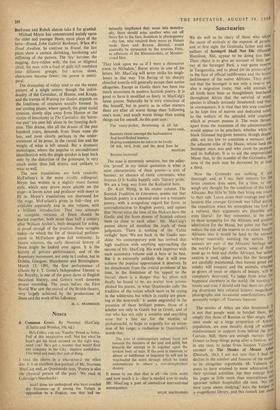Noses
A Common Grace. By Norman MacCaig. (Chatto and Windus, 10s. 6d.) He's Celtic, yoii see. Touchy. Proud as Satan. Full of this imaginative stuff. Not but what he hasn't got his head screwed on the right way, mind you! He's got a manner that would float any company in the City: inspires confidence. Fine head and nose; that sort of thing.
I read the above in a who-done-it the other day. It is an excellent pen-portrait of Mr. Norman MacCaig and, as Quasimodo says, 'Poetry is also the physical person of the poet.' We read in Coleridge's Notebooks: Alas! those are endangered who have avoided the Extremes—as if among the Tartars in
opposition to Fanion, one that had un-
naturally lengthened their noses into monstro- sity, there should arise another who cut off theirs flat to the face, Socinians in physiognomy —the few, who retained their noses as Nature made them and Reason dictated, would assuredly be persecuted by the noseless Party, as adherents of the Rhinocerotists,- or Monster- nosed Men.
'They look upon me as if I were a rhinoceros come to Nithsdale,' Burns wrote in one of his letters. Mr. MacCaig will never strike his neigh- bours in that way. The flaring of his sharply chiselled nostrils will generally escape their notice altogether. Except in Gaelic there has been too much snoutiness in modern Scottish poetry. It is good to have it modified so finely in MacCaig's latest poems. Naturally he is very conscious of this himself, but in poetry as in other matters there are after all worse things than 'following one's nose,' and much worse things than nosing things out for oneself. As this poet says : The nosey-parker, thrumming at all his nerve-ends, Saunters about amongst the husbandmcn And hard-fleshed hunters Making translations he takes to be lovely Of fish, bird, fruit: and the dead lives he mentions Become immortal.
The nose is extremely sensitive, but the adjec- tive 'proud' in my initial quotation is what is most characteristic of these poems—a sort of hauteur, an absence of rustic coarseness, what Seumas 0 h-Aodha happily calls 'literary pride.' We are a long way from the Kailyaird here.
Dr. Kurt Wittig, in his recent volume, The Scottish Tradition in Literature, points out that Scottish poetry is a classical and not a romantic poetry, with a scrupulous regard for form, in contradistinction to English poetry, and opines that 'Never since the time of the Makars have the Gaelic and the Scots stream of Scottish culture been so close to each other.' Mr. MacCaig's poems above all manifest the truth of these judgments. There is nothing of the 'Celtic twilight' here. We are back in the Gaelic sun- shine. No contemporary poet has revived that high tradition with anything approaching the success of Mr. MacCaig. His work improves with each successive volume and is here at its best. But it is extremely unlikely that it will ever achieve the popular appreciation it deserves. In his detachment from the crucial problems of his time, in the limitation of his appeal to the literati, there is a danger that his place will finally be found to be, no matter how accom- plished his poems, in what Quasimodo calls 'the tradition of the voices which seem to be crying in the wilderness but which in reality are gnaw- ing at the non-truth.' It seems ungrateful in the presence of these brilliant poems, those of a scholar not only in Gaelic but in Greek, and of one who has not only a sensitive and searching nose but a fine ear for the niceties of piobaireachd, to hope so urgently for an exten- sion of his range, a realisation in Quasimodo'3 words that :
The core of contemporary culture faces not towards the disasters of the soul and spirit, but towards the attempt to fit together again the broken body of man. If the poet is timorous or absent or indifferent or impotent he will not be vouchsafed the word through which he could communicate to others a non-metaphysical destiny.
It seems to me that that is all—the little more and how much it is—that is needed now to make Mr. MacCaig a poet of immediate international consequence.
HUGH MaCDIARMID


































 Previous page
Previous page